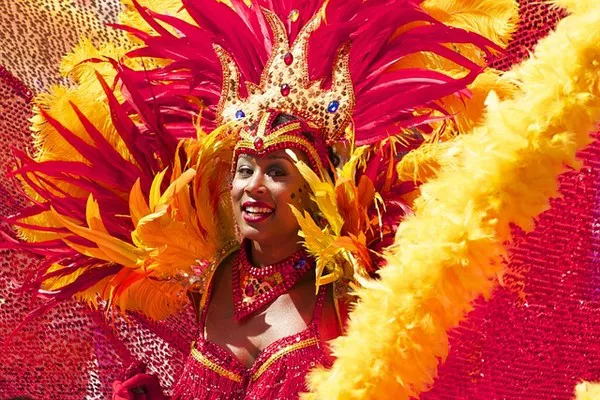The Notting Hill Carnival, a vibrant and eclectic celebration of Caribbean culture, stands as one of the most renowned festivals in the UK. Held annually in Notting Hill, West London, this carnival draws millions of visitors from around the world, offering a rich tapestry of music, dance, and cultural expression. Understanding the origins of Notting Hill Carnival involves delving into its historical roots, cultural influences, and the socio-political context in which it emerged. This article provides a detailed examination of where Notting Hill Carnival originated, exploring its inception, evolution, and current significance.
Historical Roots of Notting Hill Carnival
1. Caribbean Carnival Traditions
The Notting Hill Carnival’s roots can be traced back to the Caribbean, where carnival celebrations have been a longstanding tradition. Caribbean carnivals, particularly those in Trinidad and Tobago, are characterized by their vibrant parades, elaborate costumes, and exuberant music.
Origins: Caribbean carnivals have origins in pre-Columbian indigenous festivals and African traditions brought to the Caribbean by enslaved Africans. These celebrations evolved over centuries, incorporating elements of European masquerade balls and other cultural influences.
Cultural Significance: Caribbean carnivals are deeply rooted in themes of resistance, freedom, and cultural expression, serving as a platform for communities to celebrate their heritage and address social issues.
2. Migration and the Birth of a New Tradition
The migration of Caribbean people to the UK in the post-war period played a crucial role in the establishment of Notting Hill Carnival. The post-World War II era saw a significant influx of Caribbean immigrants, who brought with them their rich cultural traditions, including carnival.
Windrush Generation: The arrival of the Windrush generation in the late 1940s and early 1950s marked a significant moment in British history, with Caribbean immigrants contributing to the cultural and social fabric of the UK.
Cultural Exchange: The migration of Caribbean communities led to a cultural exchange, blending Caribbean carnival traditions with British cultural elements, eventually giving rise to the Notting Hill Carnival.
The Evolution of Notting Hill Carnival
1. Early Beginnings
The Notting Hill Carnival as it is known today began in the early 1960s. Its origins can be traced to a series of local community events and celebrations that gradually evolved into a larger, more organized festival.
Initial Events: The earliest celebrations were modest gatherings organized by Caribbean residents in the Notting Hill area. These events were often held in community centers or on the streets, featuring music, dance, and food.
Community Efforts: The efforts of local community leaders and activists were instrumental in shaping the carnival’s early form, creating a space for Caribbean culture to be celebrated and shared with a wider audience.
2. Formalization and Growth
The 1970s and 1980s saw the formalization and expansion of Notting Hill Carnival, transforming it into a major cultural event. Several key factors contributed to this growth.
Organizational Structure: The establishment of formal organizations, such as the Notting Hill Carnival Trust, helped in organizing and managing the carnival. These organizations played a crucial role in coordinating the event and ensuring its success.
Increased Participation: As the carnival grew in popularity, participation increased, with more people from diverse backgrounds joining in the celebrations. The carnival became a platform for showcasing Caribbean culture to a broader audience.
Cultural and Socio-Political Influences
1. Socio-Political Context
The socio-political context of the 1960s and 1970s played a significant role in shaping Notting Hill Carnival. The carnival emerged during a period of social change and racial tensions in the UK.
Racial Tensions: The carnival provided a means for Caribbean communities to assert their cultural identity and address issues of racial discrimination and social inequality.
Community Solidarity: The carnival served as a platform for community solidarity, fostering a sense of unity and pride among Caribbean residents.
2. Cultural Influences
Notting Hill Carnival is a melting pot of cultural influences, blending Caribbean traditions with British elements.
Music and Dance: The carnival features a diverse range of music genres, including calypso, soca, reggae, and steel pan. Dance is an integral part of the carnival, with vibrant performances and costumes adding to the spectacle.
Costumes and Parades: The elaborate costumes and parades are inspired by Caribbean carnival traditions, with participants often dressing in colorful, intricate outfits. These elements reflect the creativity and artistic expression of Caribbean culture.
Notting Hill Carnival Today
1. Current Significance
Today, Notting Hill Carnival is one of the largest street festivals in Europe, attracting millions of visitors each year. It continues to celebrate Caribbean culture while also reflecting the diversity of London’s multicultural population.
Global Recognition: The carnival has gained international recognition, with visitors from around the world coming to experience its vibrant atmosphere and cultural richness.
Cultural Impact: The carnival plays a crucial role in promoting cultural diversity and fostering community spirit, serving as a platform for cultural exchange and understanding.
2. Challenges and Future Directions
Despite its success, Notting Hill Carnival faces various challenges, including issues related to safety, funding, and community relations.
Safety Concerns: Ensuring the safety of participants and visitors remains a priority, with ongoing efforts to address issues such as crowd control and public order.
Funding and Support: Securing adequate funding and support for the carnival is essential for its continued success, with various stakeholders involved in its organization and management.
See also: Where Did St. Patrick’s Day Come From?
Conclusion
Notting Hill Carnival originated from a rich tapestry of Caribbean carnival traditions, combined with the cultural contributions of Caribbean immigrants to the UK. Its evolution from modest community gatherings to a major international festival reflects the dynamic nature of cultural expression and community solidarity. The carnival continues to celebrate Caribbean heritage while embracing the diversity of London’s population, serving as a powerful symbol of cultural integration and unity. By exploring its origins, evolution, and current significance, we gain a deeper appreciation for Notting Hill Carnival and its role in the cultural landscape of the UK.

